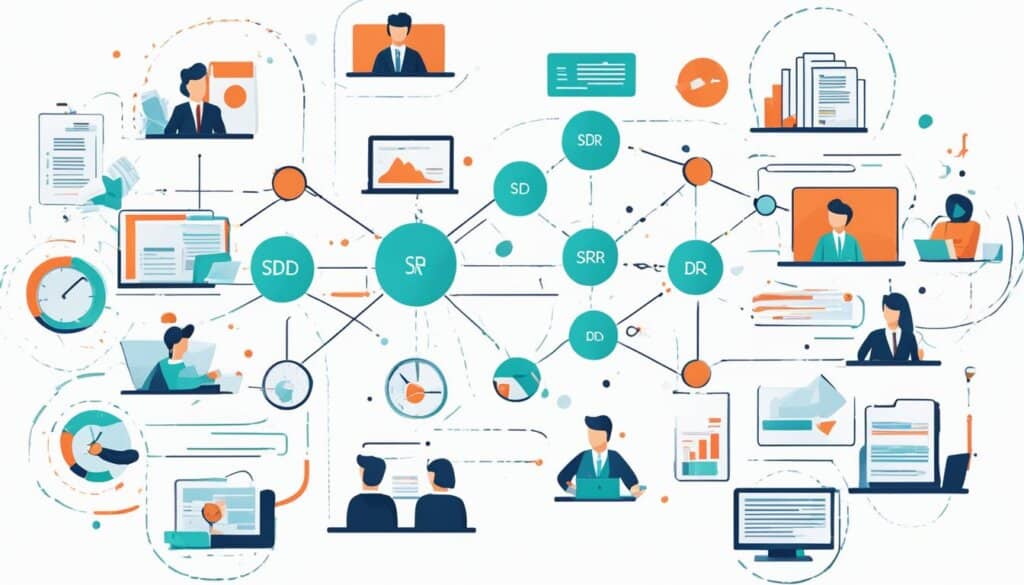Table of Contents
Are you curious about what exactly an SDR is? Or perhaps you’re interested in diving into the world of sales development? In this article, we will explore the basics of sales development and shed light on the role of a Sales Development Representative (SDR).
An SDR is a crucial member of the inside sales team, specializing in outbound prospecting and lead qualification. Their primary goal is to work hand-in-hand with account executives, supporting them in closing deals by determining whether a lead is a good fit for their company.
SDRs collaborate closely with the marketing team, receiving lead information and nurturing and qualifying leads until they are ready to make a purchase. While SDRs do not directly close deals, their expertise lies in moving potential customers along the sales pipeline.
What sets SDRs apart is their unique measurement criteria. While traditional sales reps are measured by their ability to close deals, SDRs are evaluated based on their aptitude for progressing leads through the pipeline.
To excel in this role, SDRs must possess a diverse range of skills. This includes video prospecting, active listening, following up with leads, resilience, coachability, self-awareness, organizational abilities, curiosity, and effective relationship-building.
What Does a Sales Development Representative Do?
The primary responsibility of a sales development representative is to move leads through the sales pipeline. They focus on nurturing and qualifying leads rather than closing deals. The inside sales team structure typically involves the marketing team sending lead information to the SDRs, who are then responsible for qualifying and nurturing leads until they are ready to purchase. At that point, sales reps take over to close the deal. The role of an SDR is to identify if a lead is a good fit for the company and determine their level of interest and readiness to purchase. This workflow serves as the foundation for most sales operations.
“The role of an SDR is crucial in the sales process. They ensure that leads are properly qualified, nurtured, and ready for the final stage of the sales cycle, where the sales reps take over. By focusing on nurturing and qualifying leads, SDRs contribute to the overall success of the sales pipeline.”
SDRs play a vital role in the overall success of a sales team. By nurturing leads and ensuring they are ready for the sales reps, SDRs help maintain a healthy sales pipeline. Their ability to identify qualified leads and determine their level of interest sets the stage for a successful sales process.
Essential Skills for SDRs
To be a successful Sales Development Representative (SDR), it is crucial to master a range of essential skills. These skills enable SDRs to effectively navigate the complex world of sales and prospecting, setting them apart from their competition. Let’s explore some of these key skills:
1. Video Prospecting
Video prospecting is an invaluable skill that allows SDRs to engage potential customers using personalized videos. By leveraging this method, SDRs can create a human connection, showcase their personality, and effectively communicate their value proposition, resulting in higher response rates and improved lead quality.
2. Customized Outreach
Customized outreach involves tailoring communication efforts to each prospect’s specific needs and pain points. This personalized approach demonstrates a genuine interest in understanding the prospect’s challenges and positions the SDR as a valuable resource. By crafting customized messages, SDRs can increase response rates and build meaningful connections.
3. Active Listening
Active listening is an essential skill for any SDR. By actively listening to prospects, SDRs can gather important information about their pain points, goals, and objections. This skill allows SDRs to respond appropriately, address objections, and position their product or service as a solution that meets the prospect’s needs.
4. Follow-Up
Following up is crucial for maintaining momentum in the sales process. SDRs need to have strong follow-up skills to nurture leads, answer questions, and address concerns. By consistently following up, SDRs can build trust, move prospects along the sales pipeline, and increase the likelihood of closing deals.
5. Resilience
Sales can be a challenging field, and resilience is key to success. SDRs need to be resilient in the face of rejection, setbacks, and obstacles. By maintaining a positive mindset and persevering through difficult situations, SDRs can continue to push forward and achieve their goals.
6. Coachability
SDRs should be open to feedback and willing to learn and improve their skills. Coachability allows SDRs to adapt to changing market dynamics, implement new strategies, and refine their approach. This willingness to learn and grow ensures that SDRs stay ahead of the competition and continuously improve their performance.
7. Self-Awareness
Self-awareness is crucial for SDRs to understand their strengths, weaknesses, and areas for improvement. By recognizing their own limitations, SDRs can seek support, leverage their strengths, and work on enhancing their weaker areas. This self-awareness fosters personal growth and allows SDRs to excel in their role.
8. Organization
Effective organization is essential for SDRs to manage their time and prioritize tasks. SDRs often have multiple leads and responsibilities, making it important to stay organized and ensure that no prospect or opportunity falls through the cracks. By implementing systems and processes, SDRs can stay on top of their workload and maximize productivity.
9. Curiosity
A curious mindset is crucial for SDRs to uncover valuable information about prospects and their businesses. By asking insightful questions, conducting thorough research, and seeking to understand the prospect’s pain points, SDRs can position themselves as trusted advisors and offer relevant solutions.
10. Relationship-Building
Building and nurturing relationships is a fundamental skill for SDRs. By establishing strong connections with prospects, SDRs can foster trust, credibility, and loyalty. These relationships lay the foundation for long-term partnerships and increase the likelihood of successful conversions.
11. Overcoming Objections
Objections are a natural part of the sales process, and SDRs need to be skilled in overcoming them. By understanding and addressing objections effectively, SDRs can build credibility and confidence in their prospects. This skill enables SDRs to navigate objections and move the sales conversation forward.
Incorporating these essential skills into their daily practice allows SDRs to excel in their role and drive successful outcomes. By continuously honing these skills, SDRs can become top performers and valuable assets to their organizations.

Career as a Sales Development Representative
If you are considering a career as a sales development representative (SDR), there are a few steps you can take to position yourself for success in this dynamic role.
1. Gain relevant training and sales experience: Start by acquiring the necessary knowledge and skills through training programs or courses focused on sales development. Additionally, seek opportunities to gain practical sales experience, whether through internships or entry-level sales roles.
2. Network to expand your opportunities: Building a strong professional network can open doors to exciting SDR opportunities. Attend industry events, join relevant online communities, and engage with professionals in the field to broaden your connections and access potential job opportunities.
3. Develop key skills for success: As an SDR, it is essential to possess key skills such as effective communication, active listening, relationship-building, and problem-solving. Additionally, embracing new technologies, like video prospecting and customized outreach, can give you a competitive advantage.
In conclusion, embarking on a career as a Sales Development Representative can be highly rewarding, offering growth opportunities and development. By gaining relevant training, building a strong professional network, and honing essential skills, you can pave the way for a successful career in sales development.
FAQ
What is an SDR?
An SDR, or sales development representative, is a member of the inside sales team who focuses on outbound prospecting and qualifying leads.
What is the role of an SDR?
The primary responsibility of an SDR is to move leads through the sales pipeline by nurturing and qualifying them.
How does the inside sales team structure work?
The inside sales team structure involves the marketing team sending lead information to the SDRs, who then qualify and nurture the leads until they are ready to purchase.
What is the difference between an SDR and a sales representative?
SDRs focus on moving leads through the sales pipeline, while sales reps focus on closing deals. SDRs do not close deals themselves.
What are some essential skills for SDRs?
Essential skills for SDRs include video prospecting, customized outreach, active listening, follow-up, resilience, coachability, self-awareness, organization, curiosity, and relationship-building.
How can I succeed as an SDR?
To succeed as an SDR, you can take steps such as training in sales development, gaining sales experience, and networking with professionals in the field.







